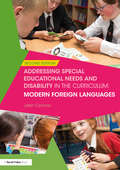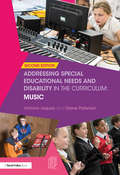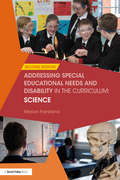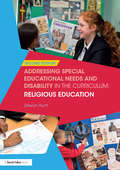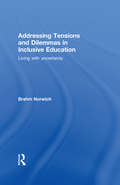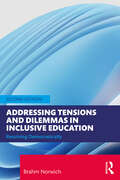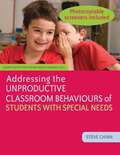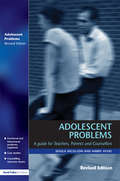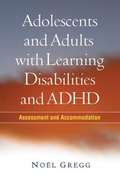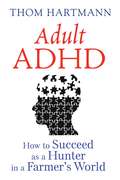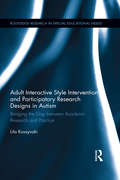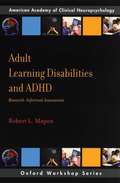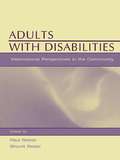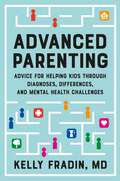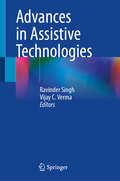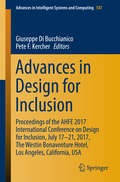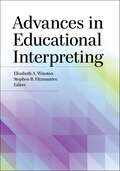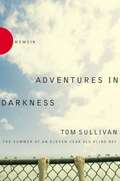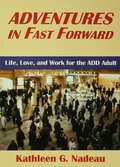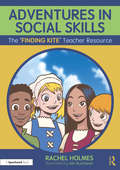- Table View
- List View
Addressing Special Educational Needs and Disability in the Curriculum: Modern Foreign Languages (Addressing SEND in the Curriculum)
by John ConnorThe SEND Code of Practice has reinforced the requirement that all teachers must meet the needs of all learners. This book provides practical, tried and tested strategies and resources that will support teachers in making modern foreign languages accessible, challenging and exciting for all pupils, including those with special needs. The author draws on a wealth of experience to share his understanding of how SEND can affect learning and how the MFL teacher can reduce or remove any barriers to learning. Offering strategies that are specific to the context of MFL teaching, this book will enable teachers to: ensure all pupils are able to participate fully in every lesson; develop pupils’ understanding, motivation and enjoyment; adapt content and resources when differentiating materials for pupils with a wide range of learning needs; use formative assessments to measure learning. An invaluable tool for whole-school continuing professional development, this text will be essential for teachers (and their teaching assistants) seeking guidance specific to teaching languages to all pupils, regardless of their individual needs. This book will also be of interest to SENCOs, senior management teams and ITT providers.
Addressing Special Educational Needs and Disability in the Curriculum: Music (Addressing SEND in the Curriculum)
by Diane Paterson Victoria JaquissThe SEND Code of Practice (2015) has reinforced the requirement that all teachers must meet the needs of all learners. This topical book provides practical, tried and tested strategies and resources that will support teachers in making music lessons accessible and exciting for all pupils, including those with special needs. The authors draw on a wealth of experience to share their understanding of special educational needs and disabilities and show how the music teacher can reduce or remove any barriers to learning. Offering strategies that are specific to the context of music teaching, this book will enable teachers to: ensure all pupils are able to enjoy and appreciate music; find the appropriate musical instruments to suit the individual learner; develop approaches for teaching composition in mixed ability classrooms; provide opportunities for different types of performance; adapt content, approaches and resources for pupils with a wide range of learning needs. An invaluable tool for continuing professional development, this text will be essential for teachers (and their teaching assistants) seeking guidance specific to teaching music to all pupils, regardless of their individual needs. This book will also be of interest to SENCOs, senior management teams and ITT providers. In addition to free online resources, a range of appendices provides music teachers with lesson case studies, behaviour plans and guidance on behaviour management and effective teaching. This is an essential tool for music teachers and teaching assistants, and will help to deliver successful inclusive lessons for all pupils.
Addressing Special Educational Needs and Disability in the Curriculum: Science (Addressing SEND in the Curriculum)
by Marion FranklandThe SEND Code of Practice (2015) reinforced the requirement that all teachers must meet the needs of all learners. This topical book provides practical, tried and tested strategies and resources that will support teachers in making science lessons accessible and exciting for all pupils, including those with special needs. The author draws on a wealth of experience to share her understanding of special educational needs and disabilities and show how science teachers can reduce or remove any barriers to learning. Offering strategies that are specific to the context of science teaching, this book will enable teachers to: help all students develop their ‘evidence-gathering’ skills and aid their scientific discovery by involving the use of all of the senses and structuring tasks appropriately; create a supportive environment that maximises learning opportunities; plan the classroom layout and display to enhance learning; use technology to adapt lessons to the needs of individual pupils; successfully train and fully use the support of their teaching assistants. An invaluable tool for continuing professional development, this text will be essential for teachers (and their teaching assistants) seeking guidance specific to teaching science to all pupils, regardless of their individual needs. This book will also be of interest to SENCOs, senior management teams and ITT providers. In addition to free online resources, a range of appendices provide science teachers with a variety of writing frames and activity sheets to support effective teaching. This is an essential tool for science teachers and teaching assistants, and will help to deliver successful, inclusive lessons for all pupils.
Addressing Special Educational Needs and Disability in the Curriculum: Second Edition (Addressing SEND in the Curriculum)
by Dilwyn HuntThe SEND Code of Practice (2015) reinforced the requirement that all teachers must meet the needs of all learners. This topical book provides practical, tried and tested strategies and resources that will support teachers in making RE lessons accessible and interesting for all pupils, including those with special needs. The author draws on a wealth of experience to share his understanding of special educational needs and disabilities and show how the RE teacher can reduce or remove any barriers to learning. Offering strategies that are specific to the context of RE teaching, this book will enable teachers to: create a supportive environment which maximises learning opportunities; plan the classroom layout and display to enhance learning; help students of all levels to gain confidence in their reading and writing ability; stimulate discussion and develop thinking skills through using stimuli such as religious art, music, artefacts and films; successfully train and fully use the support of their teaching assistants. An invaluable tool for continuing professional development, this text will be essential for teachers (and their teaching assistants) seeking guidance specific to teaching RE to all pupils, regardless of their individual needs. This book will also be of interest to SENCOs, senior management teams and ITT providers. In addition to free online resources, a range of appendices provide RE teachers with a variety of writing frames and activity sheets to support effective teaching. This is an essential tool for RE teachers and teaching assistants, and will help to deliver successful, inclusive lessons for all pupils.
Addressing Tensions and Dilemmas in Inclusive Education: Living with uncertainty
by Brahm NorwichBased on extensive research, Addressing Tensions and Dilemmas in Inclusive Education presents a contemporary and critical analysis of the interaction between different perspectives and positions in the field of inclusive education. Referring to existing attitudes on the education of children and young people with learning difficulties and disabilities, Professor Norwich argues that despite the appeal of inclusion as a single powerful position, its practical realisation involves tensions and dilemmas that have to be addressed and resolved. This core analysis is illustrated by a review of relevant national and international concepts, principles, research and practices drawing on literature in areas of current interest and concern, such as: identification and classification; current national and international conceptions; pedagogic and curriculum issues; organisation of schooling; parental and student perspectives; the contribution of research to policy and practice. Engaging with the fundamental issues in the field and providing a coherent perspective that recognises and justifies the inter-connection between specialised and general school provision, this accessible and timely book will be of interest to all researchers and students of inclusive education.
Addressing Tensions and Dilemmas in Inclusive Education: Resolving Democratically
by Brahm NorwichThis updated second edition of Addressing Tensions and Dilemmas in Inclusive Education further develops the critical analysis of the initial edition that integrates the interaction between different perspectives and positions in the field of inclusive education. This key resource expands the arguments present in the first edition with clearer implications about how to address tensions and dilemmas in inclusive education, and resolve them through democratic deliberation. Based on contemporary research, theory and policy, as well as responding to current perspectives towards the education of children and young people with learning difficulties and disabilities, Brahm Norwich extends and refines the original core argument of the previous edition – the practical realisation of inclusion involves tensions and dilemmas that have to be addressed and resolved. This core analysis focuses on:- identification and classification- current national and international conceptions- pedagogic and curriculum issues- organisation of schooling- parental and student perspectives and the contribution of research to policy and practice.Re-engaging with the fundamental issues in the field and providing a coherent perspective that recognises and justifies the inter-connection between specialised and general school provision, this accessible new edition will be of interest to all students and researchers of inclusive education.
Addressing the Unproductive Classroom Behaviours of Students with Special Needs
by Steve Chinn*Shortlisted for the 2011 NASEN Award 'Book to Promote Professional Development'*Certain classroom behaviours can signify an underlying learning disability. This book will help you recognise potential indicators of Asperger Syndrome, dyslexia, dyspraxia, AD/HD, physical disabilities and speech and language disorders; explores the benefits of different interventions; and offers practical strategies for improving pupils' behaviours, social skills and self-esteem. This book contains:- A simple-to-use screener for initial identification of a pupil's specific learning disability- A practical and simple structure for monitoring classroom behaviours and creating an Individual Behaviour Plan- Tried-and-tested teacher strategies for common areas of concern, such as problems staying on task, inability to work on group tasks and failure to seek help when needed- Key educational theories to help teachers understand and influence classroom behaviours, and further develop classroom management skills for addressing the behaviours of special needs pupils. This practical, accessible book is an essential tool kit for special educational needs coordinators, learning support staff and teachers in both primary and secondary schools.
Adjustment to Severe Physical Disability: A Metamorphosis
by Charlene Deloach Bobby G. Greer<p><i>Adjustment to Severe Physical Disability: A Metamorphosis</i>, then, is designed for professionals-in-training, practicing professionals, and parents or families of disabled persons. <p>The book deals with (1) the societal misconceptions that impede the physical, psychological, and social adjustment of disabled persons; (2) the effects these misconceptions have on the attitudes and effectiveness of those who work with disabled persons; and (3) existing services, laws, environmental changes, and technological advances that affect both the efforts of professionals and the lives of disabled persons. In keeping with the goals of this book, the content ranges from hard science to advocacy, from objective data to personal experiences. Case illustrations are designed to stimulate discussion and self-exploration, as well as to illuminate the factual basis for author opinions with no printed sources. Ideally, these illustrations will serve a heuristic function, leading students to conduct needed research into the psychosocial aspects of disability. </p>
Adjustment to Visual Disability in Adolescence
by Emory L. Cowen Rita P. Underberg Ronald T. Verrillo Frank G. BenhamThis volume describes a three-year research program in which the determination of some factors relating to adjustment in visually disabled adolescents was a prime objective.
Adolescent Problems: A Practical Guide For Parents, Teachers And Counsellors
by Harry Ayers Doula NicolsonFirst published in 1997, this book has been updated and revised to bring it in line with new legislation and current concerns. It is an eclectic reference book on adolescent emotional and behavioural problems, covering a range of psychological theories and approaches in a readable style. The theory presented is tied in with practical application using illustrative case studies and there are time-saving interview sheets and other material for teachers/counsellors to use.
Adolescents and Adults with Learning Disabilities and ADHD
by Noël GreggMost of the literature on learning disabilities and attention-deficit/hyperactivity disorder (ADHD) focuses on the needs of elementary school-age children, but older students with these conditions also require significant support. Comprehensive and authoritative, this book helps educators and clinicians navigate the maze of laws, policies, and scientific research relating to diagnostic and intervention decision making for adolescents and adults. Leading expert No\u00ebl Gregg provides clear guidance on how to conduct and document evidence-based assessments and select appropriate instructional and testing accommodations. Featuring helpful case vignettes, decision-making flowcharts, and coverage of the latest assistive technologies, the book gives special attention to supporting students during the crucial transition from high school to higher education or vocational settings.
Adult ADHD: A Reader-Friendly Guide (2nd edition)
by Michele Novotni Thomas A. WhitemanInformation about attention deficit, hyperactivity disorder in adults.
Adult ADHD: How to Succeed as a Hunter in a Farmer’s World
by Thom HartmannHow to harness your ADHD “hunter” strengths to start your own business and prosper in the workplace• Provides organizational strategies, tips to maintain focus, and tools to set goals, build a business plan, and discover the right project to keep you motivated• Shares ADHD success stories from Fortune 500 CEOs, inventors, small business owners, and the author’s own experience in launching new businesses• Explains the positive side of ADHD behavior in the context of creating a business, working within an existing company, and raising children with ADHDMost people do not “grow out” of Attention Deficit Disorder (ADD) or Attention Deficit Hyperactivity Disorder (ADHD). For many, their ADHD traits have led to difficulties in school, relationships, and work. But for our hunter-gatherer ancestors these characteristics were necessary for survival. Hunters must be easily distractible, constantly scanning their environment, and unafraid of taking risks. When humanity experienced the agricultural revolution 10,000 years ago, a vastly different type of personality--the methodical “Farmer”--became dominant. Most of our modern world is tailored to this Farmer personality, from 9-to-5 jobs to the structure of public schools, leaving ADHD Hunters feeling like unsuccessful outcasts. However, the Hunter skill set offers many opportunities for success in today’s Farmer society--if you learn how to embrace your ADHD traits instead of fighting against them.In this step-by-step guide, Thom Hartmann explains the positive side of Hunter behavior. He reveals how Hunters make excellent entrepreneurs, sharing ADHD success stories from Fortune 500 CEOs, inventors, small business owners, and his own hands-on experience in launching new businesses. Drawing on solid scientific and psychological principles, he provides easy-to-follow organizational strategies, tips to maintain focus and create a distraction-free workspace, and tools to set goals, build a business plan, and discover the right business project to keep you motivated. Hartmann shares valuable advice for both the Hunter entrepreneur and the Hunter within an existing company and for curtailing the aggressive side of the Hunter personality in group situations or manager positions. Revealing the many ADHD opportunities hidden within the challenges of work, relationships, and day-to-day life, Hartmann also includes tips on navigating family relationships and parenting--for most Hunter parents are also raising Hunter children.
Adult Continuing Education and High School Course Catalog
by Hadley Institute for the Blind Visually ImpairedAdult Continuing Education and High School Course Catalog 2016-2017. Catalog of current distance education courses for the blind or visually impaired. Various media for the courses is available including; Braille, CD, Digital Talking Books, Large Print, Online and more. Not all courses are available in all formats.
Adult Continuing Education and High School Course Catalog
by The Hadley School for the BlindThe mission of The Hadley School for the Blind is to promote independent living through lifelong distance education programs for individuals who are blind or visually impaired, their families and blindness service providers. Hadley offers courses free of charge to its blind and visually impaired students and their families and affordable tuition courses to blindness professionals. The Adult Continuing Education Program(ACE) offers a variety of courses that cover topics ranging from Braille and academic studies to independent living, life adjustment, technology, business and employment skills and recreation. The High School Program(HS) features academic courses and electives for students who seek to earn a high school diploma. Students can earn high scholl credit, which is easily transferred to their local schools, or earn a diploma through Hadley.
Adult Interactive Style Intervention and Participatory Research Designs in Autism: Bridging the Gap between Academic Research and Practice (Routledge Research in Special Educational Needs)
by Lila KossyvakiRegardless of their cognitive and linguistic abilities, people with autism can often find it difficult to develop basic communicative skills that are necessary to gain full control over their environment and maintain their independence. Building on the author’s own cutting-edge research, Adult Interactive Style Intervention and Participatory Research Designs in Autism examines the impact that the interactive style of neurotypical individuals could have on the spontaneous communication of children with autism. This book provides clear and detailed guidance on how to conduct research into autism in real-world settings such as schools and homes. Kossyvaki critically evaluates a wealth of relevant case studies and focuses on a number of methodological issues that researchers are likely to face when carrying out research of this complex nature. The author walks the reader through present literature on the importance of spontaneous communication and the atypical way that this tends to develop in autism, before bringing the results of her own research to bear on the question of how the interactive styles of neurotypical individuals can impact on the spontaneous communication of people with autism. Adult Interactive Style Intervention and Participatory Research Designs in Autism is essential reading for academics, researchers, and postgraduate students in the fields of special educational needs, inclusion, autism, research methods, and educational and clinical psychology.
Adult Learning Disabilities and ADHD: Research-Informed Assessment
by Robert L. MapouThe book provides scientific and practical guidance on assessing learning disabilities and ADHD in adults. Topics include definitions of disability, assessment, and management approaches (from medications and therapy to educational and workplace accommodations), and assistive technology and software. The book is aimed at clinical neuropsychologists and clinical psychologists who are involved in the assessment and management of adults with learning disabilities and ADHD.
Adults With Disabilities: international Perspectives in the Community
by Paul Retish Shunit ReiterThis book concerns the process of transition that we all make throughout our lifetime, and the necessary skills individuals with disabilities need to function outside of school. The book illustrates that the problems of transition are not just for persons with disabilities, but for everyone. Acceptance of differences, understanding that our perceptions may not be accurate, and the ability to be honest with one another are shown to be key elements in assisting transition.
Advanced Parenting: Advice for Helping Kids Through Diagnoses, Differences, and Mental Health Challenges
by Kelly Fradin&“An invaluable resource for parents and caregivers,&” this important, empathetic guidebook offers practical steps for managing children's health (Emily Oster, PhD, New York Times bestselling author of Cribsheet and Expecting Better). Any parent who has ever walked out of a concerning appointment with their child's doctor or teacher has experienced a heady mix of emotions--fear, love, confusion, concern, sadness, and perhaps even anger. While every parent hopes for a healthy child, the reality is that children face many common challenges, including medical issues like ADHD, asthma, food allergies, feeding issues, learning disabilities, anxiety and depression, and developmental delays, throughout their formative years. As the role of a parent becomes one of a caregiver, it can be overwhelming for parents and children alike, particularly if money, time, access, or any combination of those are in short supply. As a balm, Dr. Kelly Fradin offers Advanced Parenting, based on her experience as a complex-care pediatrician. In this crucial guide, parents will find empathy and support as well as evidence-based practical guidance. Of greatest import is the need for tools with which to manage the emotional stress that comes from having a child who deviates from the norm, as well as coping with uncertainty and navigating the business of care. Readers will discover ways to optimize the outcomes for their family and make their day-to-day life easier.Advanced Parenting will help families from the beginning of their journey, helping parents to decide when a child needs help, accepting the implications of a challenge, obtaining a correct diagnosis, learning about the issue, building a treatment team and coming up with a comprehensive plan. Dr. Fradin explores how a child struggling can affect the entire family dynamic including the parent&’s relationships and the siblings overall well-being, and with her experience as a complex care pediatrician, she will help parents avoid common mistakes. Parents will feel seen, supported, and better prepared to be both a parent and a caregiver.
Advances in Assistive Technologies
by Vijay C. Verma Ravinder SinghThis book covers different aspects of assistive technologies. It sets up the plan for clarifying the definition and the precise role of assistive technologies in other disabilities and functional impairments. It expands the scope of assistive technologies from disabilities to functional impairments caused due to old age, various injuries, chronic diseases, neurodevelopmental disorders, and mental health conditions. Its comprehensive literature review describes current and emerging devices and presents evidence-based guidelines for matching promising technologies to individuals. Program outcomes are assessed, as are their potential impact on the future of the field. It also covers social, educational, training, manufacturing, and policy-making aspects of assistive technologies. It also describes assistive technologies based on the 5Ps, i.e., people, policy, products, provision, and personnel. It also elaborates on the assistive technologies on the aspects of awareness, availability, accessibility, affordability, acceptability, adaptability, quality, and use. It is a valuable read for therapists, medical professionals, trainees, students of allied health systems, public health specialists, policymakers, and assistive technology manufacturers.
Advances in Design for Inclusion: Proceedings of the AHFE 2017 International Conference on Design for Inclusion, July 17–21, 2017, The Westin Bonaventure Hotel, Los Angeles, California, USA (Advances in Intelligent Systems and Computing #587)
by Giuseppe Di Bucchianico Pete F KercherThis book focuses on a range of topics in design, such as universal design, design for all, digital inclusion, universal usability, and accessibility of technologies independently of people s age, economic situation, education, geographic location, culture and language. It especially focuses on accessibility for people with auditory, cognitive, neurological, and visual impairments, ageing populations, and mobility for physical special needs. The book explores some of the overlaps between inclusive design and web accessibility to help managers, designers, developers, policy makers, and researchers optimize their efforts in these overlapping areas. Based on the AHFE 2016 International Conference on Design for Inclusion, held on July 27-31, 2016, in Walt Disney World(r), Florida, USA, this book discusses new design technologies, highlighting various requirements of individuals within a community. Thanks to its multidisciplinary approach, the book represents a useful resource for readers with different kinds of backgrounds and provides them with a timely, practice-oriented guide to design for inclusion. "
Advances in Educational Interpreting
by Elizabeth A. Winston; Stephen B. FitzmauriceIn this follow up to Educational Interpreting: How It Can Succeed, published in 2004, Elizabeth A. Winston and Stephen B. Fitzmaurice present research about the current state of educational interpreting in both K-12 and post-secondary settings. This volume brings together experts in the field, including Deaf and hearing educational interpreters, interpreter researchers, interpreter educators, and Deaf consumers of educational interpreting services. The contributors explore impacts and potential outcomes for students placed in interpreted education settings, and address such topics as interpreter skills, cultural needs, and emergent signers. Winston and Fitzmaurice argue massive systemic paradigm shifts in interpreted educations are as needed now as they were when the first volume was published, and that these changes require the collaborative efforts of everyone on the educational team, including: administrators, general education teachers, teachers of the deaf, interpreters, and counselors. The contributors to this volume address research-based challenges and make recommendations for how interpreting practitioners, and all members of the educational team, can enact meaningful changes in their work towards becoming part of a more comprehensive solution to deaf education.
Adventures In Darkness: The Summer of an Eleven-Year-Old Blind Boy
by Tom SullivanFrom the book jacket: Blind since birth, author and well-known entertainer Tom Sullivan recounts with wicked wit and captivating clarity the hair-raising adventures of his eleventh year in 1950s New England... escaping from his blind school, reliefpitcher in the neighborhood league, and boxing in a backyard bout with the neighborhood bully Adventures in Darkness is a classic tale of boyhood adventure through a formative season, a summer of hilarity and heart, tears and triumph! armed with a daring dream, and the fearlessness and mischief of youth. Tom refused to settle for the conventional confines of his blindness, and set in motion a chain of events that dynamically changed his life forever.
Adventures In Fast Forward: Life, Love and Work for the Add Adult
by Kathleen G. NadeauWritten in response to common questions posed by adults with ADD in the author's clinical practice - and for all adults with ADD, as well as those who care about them - this book is designed as a clear and practical guide for day-to-day life. The author's perspective is one of compassionate realism as she answers specific questions related to understanding and accommodating ADD whether making daily decisions or larger life choices.
Adventures in Social Skills: The ‘Finding Kite’ Teacher Guide (Adventures in Social Skills)
by Rachel HolmesThis teacher resource is filled with worksheets, tasks and activities focused on developing the social skills of autistic children aged 8-12. It has been created to be used alongside the story Finding Kite: An Interactive Tudor Mystery, although activities can stand alone as a programme of intervention. Each task encourages young people to think about their own experiences, challenges and goals, building self-esteem and confidence along the way. Suitable for use in small groups or 1:1, the worksheets are flexible in design, allowing the facilitator to respond to the needs of each child. Key features of this resource include: Engaging activities divided into sections focused on ‘Making Sense of my World’ and ‘Connecting with Others’ Photocopiable and downloadable worksheets, filled with opportunities for reflection and discussion The option to use it alongside the engaging, choose your own adventure story, Finding Kite, which immerses the reader in a sensory adventure Designed for students aged 8-12, this resource provides an invaluable opportunity to build an understanding of the complexities of social dynamics. Although created with autistic girls in mind, it can be used with students of different genders and adapted for their needs.
